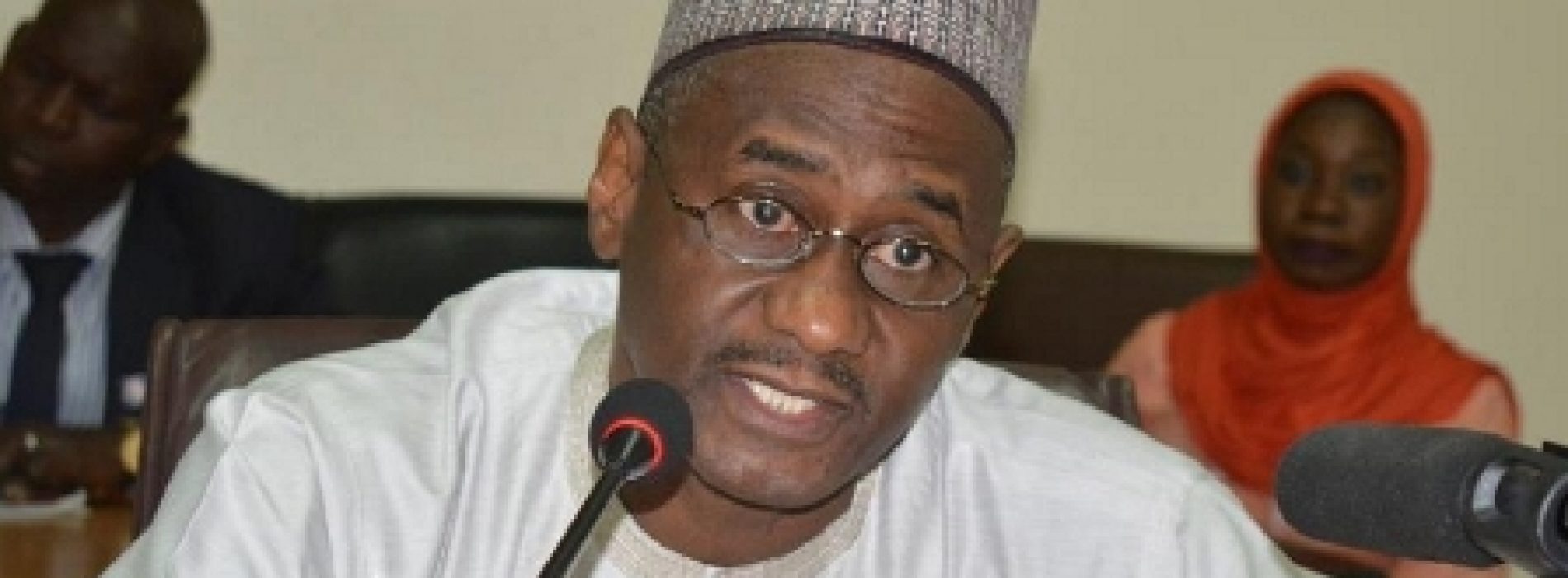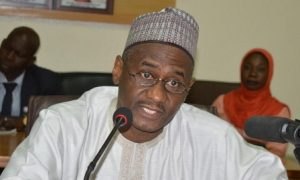Buhari reinstates suspended NHIS Executive-Secretary
- He was under probe for alleged N919m fraud, nepotism, high-handedness, sheer neglect of Procurement Act, among others.
President Muhammadu Buhari has reinstated suspended Executive-Secretary, National Health Insurance Scheme (NHIS), Prof. Usman Yusuf.
His reinstatement was contained in a letter addressed to the Minister of Health, Prof Isaac Adewole, by the presidency, sources in the Federal Ministry of Health told Nigeria Health Online.
The minister also confirmed receipt of the letter, when speaking with journalists on telephone, Tuesday night.
“It is true that the president has reinstated him,” the minister, who had been verbally attacked by the NHIS boss said.
He was advised in the letter to work closely with the Executive Secretary to help move the sector forward, sources in the ministry further revealed.
Yusuf was suspended by the minister in June 2016, barely a year on the saddle, following alleged misdeeds.
Adewole had set up a probe panel to examine allegations of gross abuse of office by the Executive Secretary.
Prof. Yusuf was accused of perpetrating fraud to the tune of N919m in addition to acts of nepotism, graft, high-handedness, sheer neglect of Procurement Act, among others.
It was not immediately clear if the minister would ‘work closely with him’ as contained in the letter.
Nigeria Health Online had reported how cabals in the presidency were in top-level move to ensure President Buhari reinstate him.
He was suspended at the time President Buhari was receiving treatment over undisclosed ailment in London.
Vice President, Yemi Osinbajo acted as President at the time.
Earlier reports have said the Executive Secretary was brought into Buhari’s government by one of the President’s top aides, and that he would not be allowed to be disgraced.
Yusuf refused to vacate office when he was suspended by the minister. He said Adewole lacked power to suspend him, but the President who appointed him. He was eventually forced out of the NHIS by security officials who were deployed to take over headquarters of the scheme in Abuja.
The House of Representatives had backed his claim, and directed President Buhari to reinstate him. The President only acted on that directive six months after.
Yusuf’s second coming may further cause disaffection in the sector, especially at the NHIS. Staff of the scheme had protested his alleged recruitment of relations and friends into offices against the norm in the scheme.
He had also deployed many senior staff outside the headquarters, many of whom have been brought back by the Acting Executive Secretary, Attahiru Ibrahim.
The Economic and Financial Crimes Commission (EFCC) and Independent Corrupt Practices and Other Related Offences Commission (ICPC) had in separate letters informed Acting Executive Secretary of the scheme, Mallam Attahiru Ibrahim, that they were set to investigate Yusuf.
The Senate, Directorate of State Services, DSS, and Federal Ministry of Health had been involved in probing the suspended official before EFCC and ICPC took over.
The Senate had in March 2017 constituted a five-member ad-hoc committee to investigate Yusuf over allegations of financial and administrative improprieties.
The ministry of health’s panel had recommended his investigation by the anti-graft agencies.
Report of the panel was submitted at the Presidency and received by Chief of Staff to the President, Abba Kyari in August 2017.
In its letter dated December 21, 2017 and titled “Investigation into activities of prof. Usman Yusuf – suspended Executive Secretary of the National Health Insurance Scheme,” the EFCC said it was investigating suspected cases of fraud and misappropriation levelled against Yusuf while he held sway between July 2016 and July 2017 at the NHIS. The letter was addressed to Acting Executive Secretary of the scheme, Ibrahim.
Similarly, ICPC, in its letter dated December 11, 2017 and addressed to Acting Executive Secretary of the NHIS said it was investigating Yusuf alongside four other employees in the agency. The commission informed the NHIS leadership that the officers were being investigated for alleged violation of the provisions of the Corrupt Practices and other related Offences Act 2000.
The commission cited alleged staff training, trips, procurements, consultancy charges among others which gulped almost a billion naira under the leadership of Yusuf and directed the new NHIS management to recover such funds.
“Pursuant to Section 45 (3) of the cited Act, you are hereby directed to recover the money advanced to the five officer and two staff from the Ministry of Health for the aborted trip to the Netherlands. You are further required to furnish the commission with the evidence of compliance by each of the beneficiaries,” read part of the letter.
In its letter with reference number CR:3000/EFCC/ABJ/CTF1.2/VOL.15/23, and signed by its Director of Operations, Umar Abba, for the Acting Chairman of the EFCC, Ibrahim Magu, the commission sought information on all necessary documents relating to local and international training programmes sponsored by the scheme from July 2016 to July 2017.
The commission demanded documents relating to the audit verification conducted within the tenure of Yusuf, and “all documents relating to payment made to Katamaya First Call Hospital; all procurement documents to the e-library project of the NHIS; all payments relating to the fuelling of the suspended Executive Secretary’s official vehicles; disbursement of NEED assessment funds between July 2016 and July 2017.”
The agency said it was making the requests pursuant to Section 38 (1) and (2) of the Economic and Financial Crimes Commission (Establishment) Act, 2004. It also asked for documents on all NHIS-sponsored foreign trips for the embattled professor.
The anti-graft agency also demanded that the NHIS management confirm if four other persons named in the letter were employees of the scheme. It also requested for their status, if they are. They are Nasir Shinkafi, Shuab Mohammed, Suleiman Ilu and Yusuf Abdullahi.
The Executive’Secretary was always condemning ‘endemic’corruption in the agency when he assumed leadership of the NHIS.
At his first three-day retreat for management staff of the scheme in Kaduna which kicked off on 30th August, 2016, Yusuf attacked health maintenance organizations (HMOs) in the country for corruptly enriching themselves with funds meant for enrolees care. He also lambasted his own staff for failing to discharge regulatory functions entrusted in the scheme, and for making the NHIS a conduit for “endemic corruption, inefficiency and political patronage.”
He decried poor coverage of the nation’s citizens under the scheme, as according to him, enrolees on the scheme were about three percent of the nation’s population when he took over mantle of leadership of the NHIS.
“When the regulator is sleeping, how do you not expect the regulator to be partying with the regulated? I have heard of HMOs and health care providers that are dictating to NHIS. It is like a commercial bank dictating to Central Bank, or an oil marketer dictating to NNPC,” he had said.
About author
You might also like
We are suffering – Resident Doctors
Following its nationwide strike notice, The Nigerian Association of Resident Doctors says there’s no going back unless both federal and state governments accede to its demand. Speaking on a radio
‘Impression out there is that NHIS can never work’ – Acting ES
• Vows to change perception ABUJA – The Acting Executive Secretary, National Health Insurance Scheme, Attahiru Ibrahim, has taken full control of the organization, days after his predecessor, Prof Usman
NHIS: Board can’t remove CEO – FG
ABUJA – The Federal government has declared that governing boards lack powers to suspend or remove chief executive officers of their agencies or institutions. Secretary to the Government of the







0 Comments
No Comments Yet!
You can be first to comment this post!